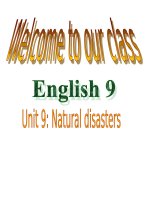- Trang chủ >>
- Đề thi >>
- Đề thi lớp 12
tiếng anh 9 unit 9 natural disasters thcs hồng bàng
Bạn đang xem bản rút gọn của tài liệu. Xem và tải ngay bản đầy đủ của tài liệu tại đây (99.52 KB, 12 trang )
<span class='text_page_counter'>(1)</span><div class='page_container' data-page=1>
<b>ANSWERS</b>
<b>Combine these sentences using relative clause</b>
1. The man is my uncle . He is standing near the window.
The man <i><b>who is standing near the window is my uncle. </b></i>
2. This is a boy . He loves his family very much.
This is <i><b>the boy who loves his family very much.</b></i>
3. The boy loves his family very much . The boy said good bye to you yesterday .
The boy <i><b>who said good bye to you yesterday loves his family very much. </b></i>
4. Our English teacher is a woman . She is talking to you.
Our English teacher <i><b>is the woman who is talking to you. </b></i>
5. The man is my father . He works in the garden.
The man <i><b>who works in the garden is my father. </b></i>
6. The shirt is very cheap . You are looking it.
The shirt <i><b>which you are looking at is very cheap. </b></i>
7. They talked about the show . They watched it on TV.
They talked <i><b>about the show which they watched on TV.</b></i>
8. Nam is cleaning the bicycle . He bought it last month.
Nam cleaning <i><b>the bicycle which he bought last month.</b></i>
9. These are the magazines . I am fond of them.
These are <i><b>the magazines which I am fond of.</b></i>
10. The town is very famous. You visited it last month.
The town <i><b>which you visited last month is very famous. </b></i>
11. You can’t borrows the books . They are in this section
You can’t <i><b>borrows the books which are in this section. </b></i>
12. This is a boy . His family is very happy
</div>
<span class='text_page_counter'>(2)</span><div class='page_container' data-page=2>
13. I have a friend . His parents are famous doctors
I have <i><b>a friend whose parents are famous doctors.</b></i>
14. He is a father. His love for the family is very great.
He is <i><b>a father whose love for the family is very great.</b></i>
15. We are proud of a student in our school . The result of the student is the highest of
district 5.
We are <i><b>proud of the student whose result in our school is the highest of district 5.</b></i>
16. I love my parents’ house. I was born in that house.
I love <i><b>my parents’ house where I was born.</b></i>
17. The day is unforgettable . We first met on that day.
The day <i><b>when we first met is unforgettable.</b></i>
18. He was born on the day. His father was away on that day.
He was <i><b>born on the day when his father was away.</b></i>
19. The beach was destroyed by a violent storm. People used to go there on holiday.
The beach <i><b>where people used to go on holiday was destroyed by a violent storm.</b></i>
20. I like standing at the window. I can see the park from this window.
I like <i><b>standing at the window which I can see the park from.</b></i>
21. The city was beautiful. We spent our vacation there.
The city <i><b>where we spent our vacation was beautiful.</b></i>
</div>
<span class='text_page_counter'>(3)</span><div class='page_container' data-page=3>
<b>PRACTICE</b>
<b>Sentence transformation</b>
1. The traffic was very heavy, but she came on time for the meeting.
Although<i><b> The traffic was very heavy, she came on time for the meeting.</b></i>
In spite of <i><b>the heavy traffic, she came on time for the meeting.</b></i>
2. I have got qualifications, but I can’t get the job.
Even though <i><b>I have got qualifications, I can’t get the job.</b></i>
Despite <i><b>my qualifications, I can’t get the job.</b></i>
3. In spite of his injured foot, he managed to walk home.
Although <i><b>his foot was injured, he managed to walk home.</b></i>
4. She decided to take the job although the salary was low.
In spite of <i><b>the low salary, She decided to take the job.</b></i>
5. My brother has not eaten for 24 hours, but he doesn’t feel hungry.
Though <i><b>My brother has not eaten for 24 hours, he doesn’t feel hungry.</b></i>
In spite of <i><b>not eating for 24 hours, he doesn’t feel hungry.</b></i>
6. I love music, but I can’t play a musical instrument.
Although <i><b>I love music, I can’t play a musical instrument.</b></i>
</div>
<span class='text_page_counter'>(4)</span><div class='page_container' data-page=4>
<b>UNIT 9:</b>
<b>NATURAL DISASTERS</b>
<b>VOCABULARY</b>
<b>1. abrupt (adj.) </b>/əˈbrʌpt/: sudden and unexpected: bất ngờ, đột ngột
<b> Ex: </b>The bus came to an abrupt halt.
<b>→ abruptly (adv.)</b> Ex: She stopped abruptly and looked at him.
<b>→ abruptness (n.)</b>
<b>2. behave (v.) </b> /bɪˈheɪv/: to do things that are good, bad, sensible etc: cư xử, ứng xử
<b> Ex: </b>She <b>behaved in a</b> very responsible <b>way</b>.
<i><b>Opposite: misbehave: </b>cư xử không đúng</i>
<b>→ behavior (n.) </b>/bɪˈheɪvjə/ : cách cư xử
<b> Ex: </b>It is important to reward good behaviour.
<b>3. can (v.) /</b> kæn/: to preserve food by putting it into a metal container from which all the air
is removed: đóng hộp
<b> → canned food: </b>thực phẩm đóng hộp
<b>→ can (n.) </b>a metal container in which food or drink is preserved without air: hộp dùng để
đóng gói thực phẩm <b>→ Ex : </b>cans of soup / a Coke can
<b>4. coast (n.) </b>/kəʊst/: the area where the land meets the sea : bờ biển
<b> Ex: </b>the west coast of Africa
</div>
<span class='text_page_counter'>(5)</span><div class='page_container' data-page=5>
<b>5. collapse (v.) </b>/kəˈlæps/: fall down suddenly, usually because it is weak or damaged: đổ sụp,
sập; ngã quỵ, ngất xỉu
Ex: <b>→ </b>The roof had collapsed long ago.
<b>→ </b>He collapsed with a heart attack while he was dancing.
<b>→ collapse (n.) </b>sự đổ sụp <b>→ </b>His business was <b>in danger of collapse</b>.
<b>6. damage </b>(n.) /ˈdæmɪdʒ/: physical harm that is done to something or to a part of someone’s
body, so that it is broken or injured: việc gây thiệt hại; hư hỏng<b> → damage to</b>
Ex: These chemicals have been found to cause serious environmental damage.
<b> → do damage / cause damage / prevent/avoid damage</b>
<b>→ damage (v.): </b>gây thiệt hại, làm hư hỏng <b>→ Ex: </b>Smoking can severely damage your health
<b>7. destroy (v.) </b>/dɪˈstrɔɪ/: to damage something so badly that it no longer exists or cannot be
used or repaired: phá hủy, tàn phá
<b>Ex:</b> The building was completely destroyed by fire.
<b>→ destruction (n.) </b>/dɪˈstrʌkʃən/: sự phá hủy<b> →destruction of </b>
Ex: The floods brought <b>death and destruction</b> to the area.
<b>8. erupt: </b>(v.) /ɪˈrʌpt/: explode and send smoke, fire, and rock into the sky<b>: </b>phun trào
Ex: Mount Pinatubo in the Philippines erupted in 1991.
<b>→ eruption (n.)</b> /ɪˈrʌpʃən/ <b>: </b>sự phun trào (của núi lửa) <b>→</b> a volcanic eruption
<b> </b>
</div>
<span class='text_page_counter'>(6)</span><div class='page_container' data-page=6>
<b>9</b>. <b>expect</b> (v.) /ɪkˈspekt/: to think that something will happen because it seems likely: mong đợi,
chờ đón <b>→ Ex: </b>The students expect to be back school within a week.
<b>→ expectation (n.) </b>/ˌekspekˈteɪʃən/: sự mong chờ
Ex: Their expectations of success were pretty low.
<b> → live up to (somebody’s) expectations: </b>đáp lại mong đợi của ai
<b> → </b>expected (adj.) ≠ unexpected
<b> → expectedly (adv.) </b>≠ unexpectedly
<b>10</b>. <b>extensive</b> (adj.) /ɪkˈstensɪv/: large in size, amount, or degree: rộng lớn
Ex: Fire has caused extensive damage to the island’s forests.
<b>→ extensively (adv.) </b>
<b>11. Forecast (n.) </b>/ˈfɔːkɑːst/: a description of what is likely to happen in the future, based on
the information that you have now: chương trình dự báo<b> → a weather forecast</b>
Ex: The <b>weather forecast</b> is good for tomorrow.
<b>→</b> <b>forecast</b>(v.) : <i>past tense and past participle </i><b>forecast</b> or<b> forecasted</b>)
Ex: Rain was forecast for the weekend.
<b> → forecaster (n.) </b>omeone whose job is to say what is likely to happen in the future,
Ex: the <b>weather forecaster: </b>người dự báo thời tiết
<b>12. asleep (adj.) </b>/əˈsliːp/: sleeping: ngủ (say)<b> →</b> Ex: Quiet! The baby’s asleep.
<b> → fall asleep: </b>sleeping: ngủ rồi
</div>
<span class='text_page_counter'>(7)</span><div class='page_container' data-page=7>
<b>13</b>. f<b>unnel</b> (n.) /ˈfʌnl/: a thin tube with a wide top that you use for pouring liquid into a
containerwith a narrow opening, such as a bottle: cái phiễu
<b>→ a funnel shapped storm: cơn lốc xoáy</b>
<b>14. tide (n.) </b>/taɪd/: a current of water caused by the tide: thủy triều
Ex: Strong tides make swimming dangerous.
<b>→ tidal (adj.) </b>/ˈtaɪdl/: thuộc thủy triều <b>→ tidal waves: </b>sóng thủy triều
<b>15</b>. <b>trust</b> (v.) /trʌst/: to believe that someone is honest; to be sure that something is correct
or right : tin tưởng vào; tin là có thực
Ex: I just don’t trust him.
You can’t trust the trains to run on time.
<b>→ trust (n.) </b>a strong belief in the honesty, goodness etc of someone or something: niềm tin
vào ai đó hoặc vào điều gì. <b>→ Ex: </b>You shouldn’t put your trust in a man like that.
<b>→ trusty (adj.) </b>[<b>only before noun</b>]: <b>reliable: able to be trusted → a trusty bike / penknife</b>
<b>16. Volcano (n.) </b>/vɒlˈkeɪnəʊ/ a mountain with a large hole at the top, through which <b>lava</b>
(=very hot liquid rock) is sometimes forced out: núi lửa
Ex: Pompei was destroyed when the <b>volcano erupted</b> in 79 AD.
<b>→ an active volcano </b>≠ an inactive volcano: núi lửa hoạt động ≠ núi lửa kg hoạt động
<b>17. safe (adj.) </b>/seɪf/ not in danger of being harmed, lost, or stolen ≠ unsafe
Ex: She doesn’t <b>feel safe</b> in the house on her own. <b>→ safely (adv.)</b>
<b>→ safety (n.): sự an toàn For</b> your <b>own safety</b>, please do not smoke inside the plane.
</div>
<span class='text_page_counter'>(8)</span><div class='page_container' data-page=8>
<b>18. science (n.) </b> /ˈsaɪəns/: knowledge about the world, especially based on examining,
testing, and proving facts: khoa học
Ex: Isaac Newton is the founder of modern science.
<b>→ scientific (adj.) </b>/ˌsaɪənˈtɪfɪk /: thuộc về khoa học◂ <b> → Ex: </b> We believe in investing in
scientific research.
<b>→ scientifically (adv.) → Ex: The theory</b> hasn’t been scientifically proven.
<b>→ scientist (n.) </b>/ˈsaɪəntɪst/: nhà khoa học
<b>19. disaster (n.) </b> /dɪˈzɑːstə/: a sudden event such as a flood, storm, or accident which causes
great damage or suffering : thảm họa
<b>→ natural disaster: </b>thảm họa thiên nhiên
<b>→ Ex: </b>The oil spill was a disaster for Alaskan sea animals.
<b>→ disastrous (adj</b>.) /dɪˈzɑːstrəs/<b>→ Ex: </b> Climate change could have disastrous effects on Earth.
<b>→ disastrously (adv.) →Ex: </b>Things began to go disastrously wrong.
<b>20. predict (v.) </b>/prɪˈdɪkt/ to say that something will happen: đoán trước, tiên đoán
Ex:<b> →</b> Experts predict that the economic situation will improve.
<b>→ </b>Experts predicted that the economic situation would improve.
<b>→</b> The population is predicted to increase.
<b>→ prediction (n.) </b>/prɪˈdɪkʃən/: sự tiên đoán Ex: It is far too early to make predictions about
the curve of corona virus on the beginning to flatten.
<b>→ predictable (adj.) </b>/prɪˈdɪktəbəl/<b> → Ex: </b> The snow had a predictable effect on traffic.
<b>→ predictably (adv.)</b>
</div>
<span class='text_page_counter'>(9)</span><div class='page_container' data-page=9>
<b>21. warn (v.)</b> /wɔːn/: to tell someone that something bad or dangerous may happen: báo
trước, cảnh báo
<b> Ex: </b>I warned you not to walk home alone.
<b> → warn somebody (not) to do something </b>
Ex: Authorities are <b>warning</b> people <b>not to go out </b>if unnecessary during the pandemic of
Covid-19.
<b>→ warning (n.) Ex: </b>warnings about the dangers of smoking
<b>22</b>. <b>border</b> (n.) ˈbɔːdə/: the official line that separates two countries, states, or areas, or
the area close to this line: biên giới, đường biên giới
<b> Ex: </b>the border between the US and Mexico
<b>→ border (v.): </b>giáp với, tiếp giáp với <b>→ Ex: </b>The Black Sea <b>borders</b> a half-dozen countries.
<b>23. bureau </b>(n.) /ˈbjʊərəʊ/: an office or organization that collects or provides information:
cơ quan, văn phòng cục <b>→ </b>an employment bureau / the weather forecast bureau
<b>24. carriage </b>(n.) /ˈkærɪdʒ/: a vehicle with wheels that is pulled by a horse, used in the past:
xe kéo <b>→ baby carriage: </b>xe nôi
<b>25. celsius</b>: (n.) /ˈselsiəs/ a scale of temperature in which water freezes at 0º and boils at
100º<b> : Centigrade: </b>độ C <b>→ 1</b>º Celsius = 33.8º F (Fahrenheit)
<b>26. strike </b>/straɪk/ (<i>past tense and past participle </i><b>struck</b> /strʌk/): something bad strikes, it
suddenly happens and affects people : điều gì xấu ập xuống, đập vào
</div>
<span class='text_page_counter'>(10)</span><div class='page_container' data-page=10>
<b>27. flashlight </b>(n.) /ˈflæʃlaɪt/a small electric light that you can carry in your hand: đèn pin
<b>28. highlands </b>(n.) /ˈhaɪləndz/:an area of a country where there are a lot of mountains:
vùng núi., vùng cao
<b>29. Pacific Rim </b>(n.) (also<b> the Pacific Rim countries</b>): the countries or parts of countries
that border the Pacific Ocean, such as Japan, Australia, and the west coast of the US: vùng
lịng chảo Thái Bình Dương, vàng đai Thái Bình Dương
<b>30. shift </b>(n.) /ʃɪft/: a change in the way something is done: sự thay đổi, sự chuyển dịch
<b>31. volume </b>(n.) /ˈvɒljuːm/:the amount of sound produced : âm lượng
<b>→ turn the volume up/down</b> Or: Can you <b>turn</b> the TV <b>up/ down </b>a bit?
<b>32. hit </b>/hɪt/(<i>past tense and past participle </i><b>hit</b>, <i>present participle </i><b>hitting; </b>strike
<b>→ Ex: </b>The village has been hit by a devastating typhoon.
<i><b><sub>Natural disasters: </sub></b></i><b><sub>→ snowstorm: bão tuyết</sub></b>
<i><b> earthquake : động đất</b></i>
<i><b> volcano: núi lửa</b></i>
<i><b> typhoon: bão nhiệt đới ở châu á</b></i>
<i><b> hurricane: bão nhiệt đới ở phía nam va bắc Mỹ</b></i>
<i><b> cyclone: bão nhiệt đới ở châu úc </b></i>
<i><b> tidal waves: sóng thủy triều</b></i>
<i><b> tornado: lốc xoáy</b></i>
<i><b> flood: lũ lụt / drought: hạn hán </b></i>
<i><b> </b></i>
</div>
<span class='text_page_counter'>(11)</span><div class='page_container' data-page=11>
<b>Language Focus: </b>
<b>Non-defining clauses</b>
<sub>The man </sub>
<i><b><sub>who</sub></b></i>
<i><b><sub> / </sub></b></i>
<i><b><sub>that </sub></b></i>
<i><b><sub>lives next door </sub></b></i>
<sub>is very friendly.</sub>
<b>→ </b>
<i><b>who</b></i>
<i><b> / </b></i>
<i><b>that </b></i>
<i><b>lives next door is adjective clause tells us which person, man is</b></i>
<sub> Where are the eggs </sub>
<b><sub>which / that </sub></b>
<sub>were in the refrigerator?</sub>
<b>→ which / that </b>
were in the refrigerator
<i><b>is adjective clause tells us which eggs are</b></i>
<i><b>In these sentences: * </b></i>
Tom’s father
<b>, </b>
<i><b>who is 78</b></i>
<b>,</b>
is swimming every day.
<i><b> * </b></i>
She told me her address
<i><b>,</b></i>
<i><b> which I wrote down on a piece of paper.</b></i>
<b>→ </b>
<i><b>who is 78; which I wrote down on a piece of paper </b></i>
do not tell us which person
or what kind of thing. We already know which person or thing is meant: “Tom’s
father and her address” . The relative clauses in these sentences just give us
“
<i><b>extra information” about the person or thing, so “who is 78; which I wrote </b></i>
<i><b>down on a piece of paper” are non- defining clauses.</b></i>
When you write non- defining clauses, you
<b>have to put commas (,) at the </b>
<b>beginning and at the end of the clause.</b>
<b>Ex: </b>
<b>→ </b>Joan<b>,</b> <b>whom I have known for ten years</b>, is one of my closest friends.<b>→ </b>Mr. Edwards<b>, whose health hasn’t been good,</b> has gone to hospital for some tests.
→ Opposite your house<b>, where there are some beautiful trees,</b> is a nice park.
</div>
<span class='text_page_counter'>(12)</span><div class='page_container' data-page=12>
<b>Have wonderful holidays </b>
<b>with your family!</b>
Don’t forget to do exercises!
</div>
<!--links-->
<a href=' />
unit 3 tieng anh 9
- 11
- 748
- 0








